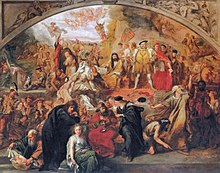Classification of the plays

The Plays of William Shakespeare. By Sir John Gilbert, 1849.
In the late 19th century, Edward Dowden classified four of the late comedies as romances, and though many scholars prefer to call them tragicomedies, his term is often used.[190] These plays and the associated Two Noble Kinsmen are marked with an asterisk (*) below. In 1896, Frederick S. Boas coined the term "problem plays" to describe four plays: All's Well That Ends Well, Measure for Measure, Troilus and Cressida and Hamlet.[191] "Dramas as singular in theme and temper cannot be strictly called comedies or tragedies", he wrote. "We may therefore borrow a convenient phrase from the theatre of today and class them together as Shakespeare's problem plays."[192] The term, much debated and sometimes applied to other plays, remains in use, though Hamlet is definitively classed as a tragedy.[193] The other problem plays are marked below with a double dagger (‡).
Plays thought to be only partly written by Shakespeare are marked with a dagger (†) below. Other works occasionally attributed to him are listed as apocrypha.